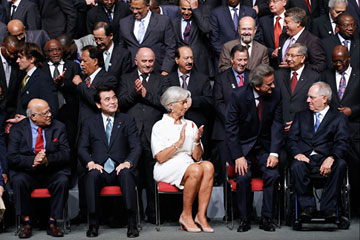
Lagarde, center, at a meeting of the International Monetary Fund and World Bank in Tokyo. She has led the IMF since 2011.
(2 of 4)
To accept that message, the E.U. will first have to close its deep schisms. Lagarde is emerging as the counterpoint to the take-your-medicine toughness of German Chancellor Angela Merkel. But with Germany growing increasingly reluctant to bail out stragglers, Lagarde's charisma alone may not be enough. Instead, she and her partners at the E.U. and the European Central Bank (ECB)--the two other arms of the troika that signs off on E.U. bailouts--have come under fire for internal squabbling when they should be presenting a united front. Lagarde inevitably catches some of the resulting flak. Some economists even seem nostalgic for the days of Lagarde's predecessor, Dominique Strauss-Kahn, who resigned in disgrace after he was hauled into a New York City jail in May 2011 on charges of sexually assaulting a hotel maid. (The charges were eventually dropped.) It was Strauss-Kahn who negotiated the IMF loans to Greece, Ireland and Portugal, using his credibility as an economist and his skill as a dealmaker to keep dissension in check.
Lagarde was supposed to be a different kind of IMF chief--if not a brilliant economist, then someone whose personal charm and sharp intellect won her close friendships with officials worldwide in her previous job as France's Finance Minister and who might bring the IMF's 188 member countries together. "I'm not sure it's an absolute necessity to be the top-notch economist to actually understand economies and help them give the best of what they can give together," she says. Still, critics argue that this is an especially inopportune time for a noneconomist to be heading the IMF. "She is not an economist, and for an institution that is so technocratic, that is sometimes a tension," says Domenico Lombardi, an Italian economist and author of a report on IMF reform. "Clearly at this juncture, having someone with some bolder thinking would be an asset."
INSIDE THE DEAL
Lagarde's formidable people skills were severely tested on March 15, during the last stage of talks over the crisis in Cyprus. She was pushing for a serious overhaul of the island's shaky banks, in which wealthy Russian companies and individuals had parked billions in offshore accounts. The meeting descended into a 10-hour political battle, and the bank overhaul was largely lost in the argument. Finance Ministers from rich, northern countries, tired of bailing out southern Europe, insisted that Cyprus' big depositors pay a hefty levy to defray some of the cost of the bailout. The island's President Nicos Anastasiades balked. Just before dawn, the troika leaders announced a compromise to spread the costs to all depositors--against Lagarde's wishes--requiring those with less than €100,000 ($129,000) to pay a fee of 6.75% on their savings while keeping the levy on big depositors to just under 10%.
Politically tone-deaf, the plan put the burden on small savers as well as big depositors; predictably, it ignited a furor. Thousands of Cypriots emptied out ATMs, and an old-fashioned bank run was prevented only because the government ordered the banks to close. As Cyprus' parliament prepared to vote on the deal, thousands stormed into the streets with the word no scrawled on their palms. The parliamentarians nixed the deal.
